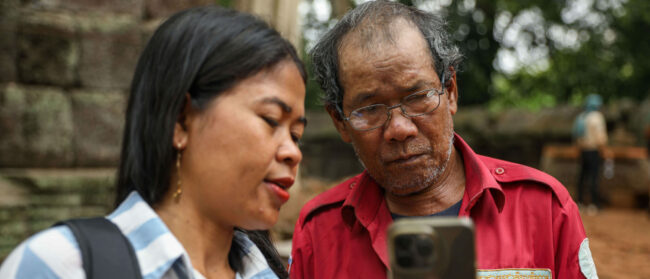Filmed over a period of six years between 2009 and 2015, A Cambodian Spring focuses on land conflict issues in Cambodia as well as the country’s volatile political state. We are introduced to individuals such as the Venerable Sovath, a monk threatened with “defrocking” by his peers for assuming the role of a citizen journalist and being too politically active. Then there is Tep Vanny, who starts out as a young leader of a community at risk of losing their land and goes on to become one of Cambodia’s most vocal activists.
A Cambodian Spring will be screened at this year’s FreedomFilmFest, taking place in Petaling Jaya, Malaysia, and running between 29 September and 6 October. The Venerable Sovath will be a guest of honour at the festival.
Southeast Asia Globe speaks to director Chris Kelly to find out more about what went into the creation of this very raw and evocative documentary.

The film had some striking and unforgettable scenes like the storming of the guards and the Venerable Loun Sovath being dragged away. Can you tell us about how you managed to obtain such close and intimate footage, and what the filming and editing process was like?
I spent a huge amount of time getting to know the Venerable Sovath and all the protestors at Boeung Kak lake, so I was able to get close because I had gained people’s trust. They knew who I was and what I was doing, so I was allowed to be around at those intimate and shocking moments.
However, the scene you mention about Venerable Sovath being dragged away was actually filmed by [him] using a hidden camera. Often, some of the most memorable scenes in the film were shot by the Venerable Sovath!
Did you ever feel like you yourself were in danger while making this film?
I never felt that I was a target of the authorities, or ever personally in danger of deliberate attacks from the police or military. However, the authorities would often respond to protestors by firing live rounds into the crowds, and as you see in the film, some people were shot dead right beside where I was filming. So, there was a danger that I could have been shot, but I did not feel like I was being deliberately targeted.
I think the situation was much more difficult for Khmer journalists covering the 2013 elections and the on-going land rights protests, as they were often targeted. Indeed, I think the situation in the country is very different now and I may have become a target: it certainly would have been much more difficult, if not impossible, to make this film in the current political climate.
Land disputes continue to be a huge problem in Cambodia. In your opinion, is there much hope of this situation improving in the coming years?
Unfortunately I don’t have a lot of hope for the land rights situation improving. I can see that China is investing heavily in Cambodia – which in itself poses many unaddressed, long-term problems for the sovereignty of the country and for the Cambodian people – and there are fewer Western donors willing to hold the government to account when they do violate the rights of its citizens. There are fewer protections for those people living under the threat of forced eviction, combined with the rapidly growing demand for land both in the cities and in rural areas. It looks bleak to me.
The film follows rights activist Tep Vanny closely. She has just recently been released from prison after two years. What do you think about her imprisonment?
I think her imprisonment was completely unjustified and 100% politically motivated, and I am delighted to see that she has been freed. I hope that she will be able to continue her activism.
The film had an incredible soundtrack, created by musician James Holden, which really added to the gravity of the documentary. How did this come about?
I wanted a soundtrack that would somehow compliment the crumbling landscapes of the film, and I am a huge fan of James Holden and the particular style of music that he makes. He has a very beautiful, decaying and melancholic sound. It is haunting and touching at the same time, and I was able to get in touch with him and show him the film and, as he liked it, he agreed to score the whole film. The soundtrack will be released on his record label later this year.
Do you have any future projects, and would you like to make any other documentaries on Cambodia, or possibly a follow up?
Yes I have a number of projects, both documentary and fiction that are set in or around Cambodia. I am working on an animated film about slavery in the Thai fishing industry at the moment. No plans for a follow up but we will see how things develop over the next few years!
The Freedom Film Network (FFN) is a not-for-profit body established to support and develop social documentary filmmaking within the context of freedom of expression and values contained in the Universal Declaration of Human Rights in Malaysia.
The FreedomFilmFest (FFF) was conceptualised and established in 2003 by Pusat KOMAS, a human rights organisation, as a creative platform to promote human rights and social filmmaking. In 2017, the organising of the festival was passed on to the FFN.
‘A Cambodian Spring’ will be screened on the 29 September, 2018


